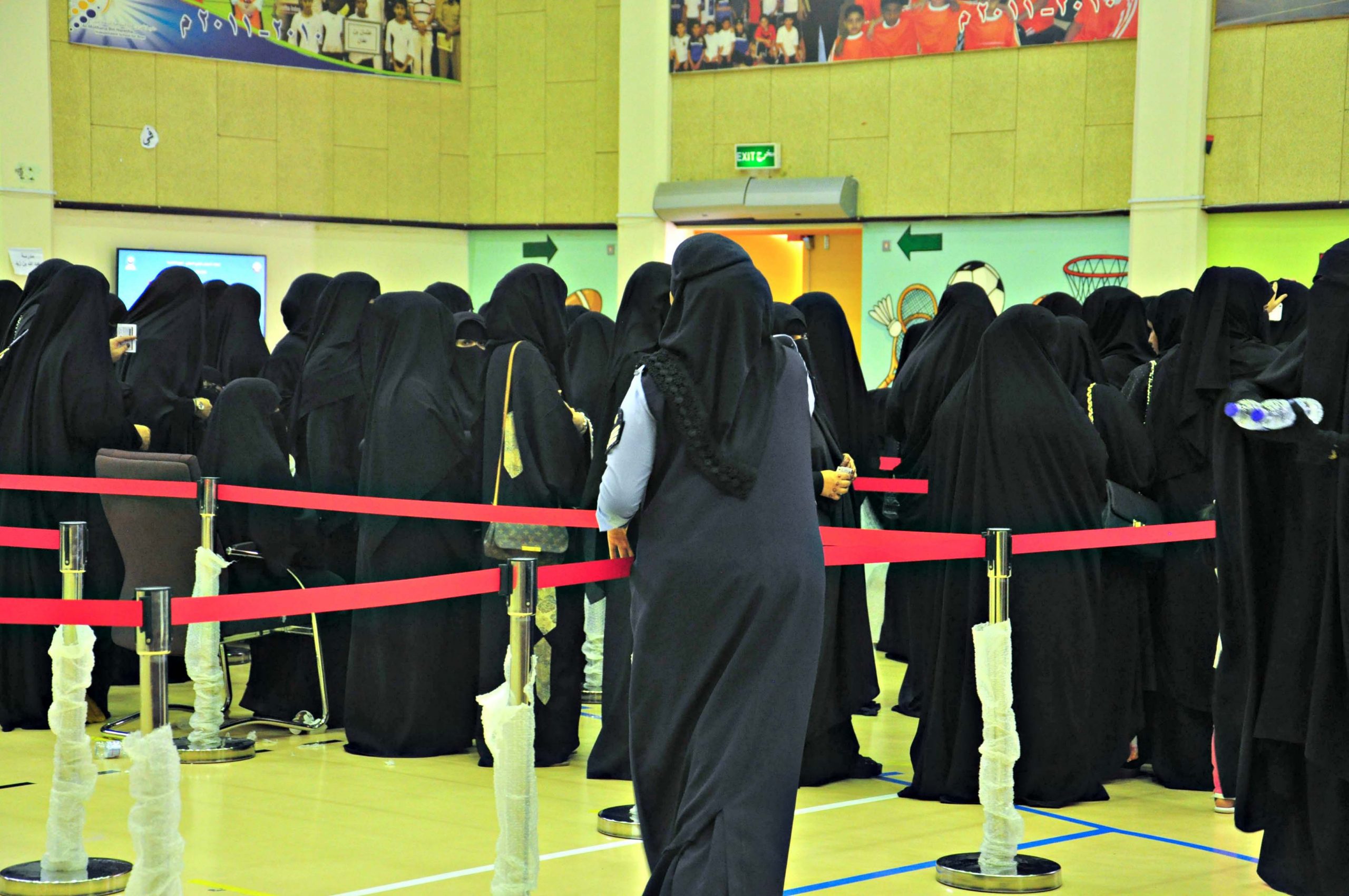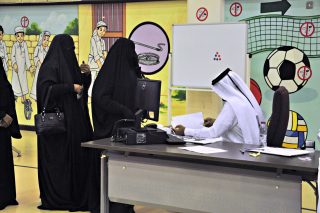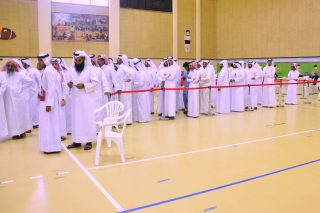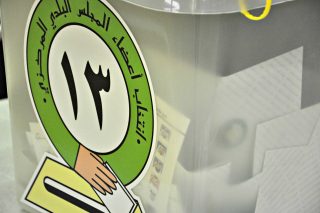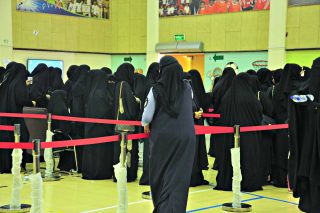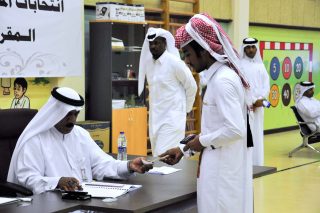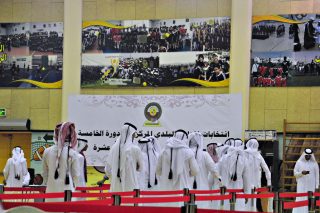All photos by Marium Saeed. Updated at 9:50am on May 14 to include the names of the elected candidates, which are listed at the end of this article.
Despite predictions of a dismal voter turnout for Qatar’s only elected political body, some Qataris said they spent nearly two hours waiting to cast a ballot today.
Early indications suggested that participation in this year’s Central Municipal Council (CMC) elections – the nation’s fifth – would be the lowest in the political body’s 16-year history.
This was in part due to re-districting that required voters to register again for the polls. But the main reason appears to be a widespread apathy toward the CMC, which lacks legislative powers and is limited to making recommendations to government officials.

The CMC is made up of 29 members. Three candidates have won their districts uncontested, and some 114 candidates – five of them women – are vying for the remaining 26 spots.
Though voter registration was low, at least 50 women could be observed waiting around midday to cast a ballot inside the school gym of Al-Muthanna bin Haritha Independent School for Boys. It was being used as a polling station in district 13 which includes the area around Villaggio Mall.
Another 30 women were waiting outside the gym, which was partitioned into different areas for male and female voters.
“This is the least number of voters we’ve had all day – it was even more crowded in the morning,” said a young election volunteer who asked not to be identified.
How voting works
Things appeared to be much quieter in the Maymouna Primary Independent Girls’ School, a polling station for district eight, which includes the area around the old Doha International Airport.
Approximately 150 women, and a smaller number of men, turned up to vote between noon and 2pm.

Upon arriving, voters registered with a judge and received their ballots.
With the help of volunteers, citizens headed to voting stations set up on a counter against the wooden partition separating the male and female areas.
Privacy barriers ensured each ballot was secretly marked, and election workers made sure that voters – even family members – were not standing too close to one another.
Afterward, ballots were slipped through a slot in the lid of a transparent plastic bin, which will be emptied and counted by judges once polls close at 5pm today.
Standing in line aside, the entire voting process at Maymouna Primary Independent Girls’ School took about five to seven minutes.
Candidates were present at the polling station, but were instructed by judges not to talk to voters or journalists and refrain from doing any campaigning.
One candidate could be overheard talking on her mobile phone, encouraging citizens to come out and vote by giving directions to polling stations and refuting arguments that it was too hot outside or that the voting site was too far from home.
What’s at stake
Many of the candidates who spoke to Doha News while on the campaign trail last month listed civic issues such as the need for more street lights, recreational paths, health clinics, supermarkets and parks in their constituencies.
“I want to give back to the country and leave a mark in my neighborhood,” said Ismail Abdullah Taymur, who is running in district 20 in Al Wakrah.

His campaign platform also touched on the need to tackle Qatar’s growing obesity rate as well as ensure that senior citizens are adequately cared for and supported in their golden years.
Candidates were also conscious of the need to turn the CMC into a respected political body that’s capable of reflecting the wishes of residents.
Amal Isa Ali al-Muhannadi, who was running in district 17 – which includes Al Kharitiyat and northern Al Gharafa – said the CMC lacks power and authority because “it has not proven itself.”
“It’s been 16 years since the first CMC elections and nothing much has been achieved,” said al-Muhannadi, who is running for the second time after an unsuccessful 2011 campaign effort. “I expect the fifth term of CMC to witness radical changes.”
The CMC remains the only elected body in Qatar. Legislative elections were supposed to occur in 2013, but were postponed after the powerful Advisory Council had its term extended to 2016.
Al-Muhannadi said she hopes today’s polling shows that “there is definitely aspiration for (an elected) parliament and more elected bodies in Qatar.”
Poll results
According to Qatar News Agency, the elected candidates are:
1st Constituency: Jassim Abdullah Jassim Al Maleki
2nd Constituency: Saeed Rashid Saeed Al-Hajiri
3rd Constituency: Hamad Khalid Khalifa Al Kubaisi
4th Constituency: Khalid Abdullah Issa Ahmed Al Hitmi
5th Constituency: Mohamed Salem Mohamed Al Marri
6th Constituency: Hamad Khalid Ahmed Mohamed Al Ghanim
7th Constituency: Abdullah Saeed Abdullah Khamis Al Sulaiti
8th Constituency: Sheikha Yousuf Hassan Al Jefairi
9th Constituency: Fatima Ahmed Khalfan Al Jaham Al Kuwari
10th Constituency: Abdurrahman Abdullah Mohamed Ali Al Khulaifi
11th Constituency: Abdullah Salim Saeed Saad Khuwar
12th Constituency: Mohamed Ali Mohamed Al Hamar Al Azba
13th Constituency: Mohamed Hamad Mohamed Al A’ttan Al Marri
14th Constituency: Mohamed Mahmoud Shafi Al Shafi
15th Constituency: Mubarak Feraish Mubarak Saleh Al Salim
16th Constituency: Mohamed Saleh Rashid Al Khayareen Al Hajiri
17th Constituency: Ali Nasser Issa Al Kaabi
18th Constituency: Mishal Abdullah Saqr Thiyab Al Nuaimi
19th Constituency: Hamad Hadi Hamad Al Buraidi Al Marri
20th Constituency: Mansour Ahmed Yousuf Mohamed Al Khater
21st Constituency: Nayef Ali Mohamed Al Ahbabi
22nd Constituency: Khalid Abdullah Mohamed Al Ghali Al Marri
23rd Constituency: Mohamed Zafer Mohamed Al Mefgae Al Hajiri
24th Constituency: Mohamed Faisal Mubarak Al Ajab Al Shahwani
25th Constituency: Nasser Ibrahim Mohamed Issa Al Mohannadi
26th Constituency: Mohamed Lahdan Ali Abu Jamhoor Al Mohannadi
27th Constituency: Rabia Hamad Ajlan Al Ajlan Al Kaabi
28th Constituency: Saeed Mubara Saeed Ali Al Rashidi
29th Constituency: Nasser Hassan Dandoun Al Kubaisi
Thoughts?

